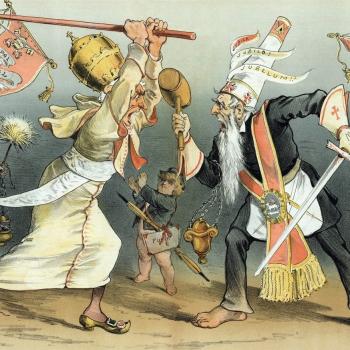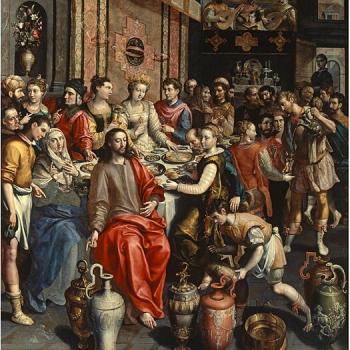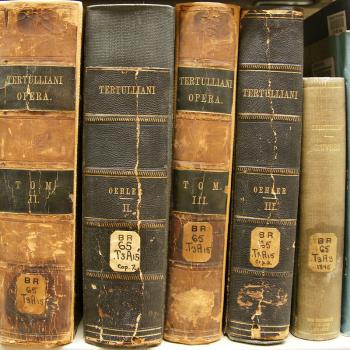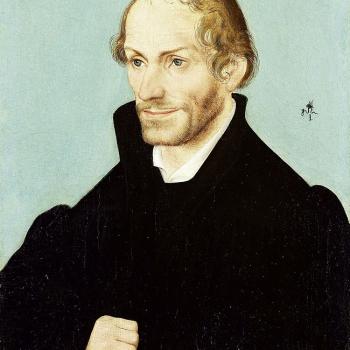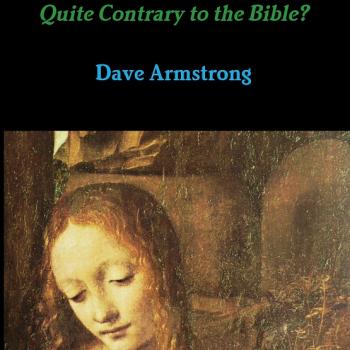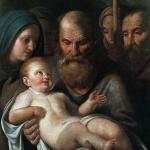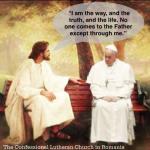Dr. Gavin Ortlund is a Reformed Baptist author, speaker, pastor, scholar, and apologist for the Christian faith. He has a Ph.D. from Fuller Theological Seminary in historical theology, and an M.Div from Covenant Theological Seminary. Gavin is the author of seven books as well as numerous academic and popular articles. For a list of publications, see his CV. He runs the very popular YouTube channel Truth Unites, which seeks to provide an “irenic” voice on theology, apologetics, and the Christian life. See also his website, Truth Unites and his blog.
In my opinion, he is currently the best and most influential popular-level Protestant apologist, who (especially) interacts with and offers thoughtful critiques of Catholic positions, from a refreshing ecumenical (not anti-Catholic), but nevertheless solidly Protestant perspective. That’s what I want to interact with, so I have issued many replies to Gavin and will continue to do so. I use RSV for all Bible passages unless otherwise specified.
All of my replies to Gavin are collected on the top of my Calvinism & General Protestantism web page in the section, “Replies to Reformed Baptist Gavin Ortlund.” Gavin’s words will be in blue.
This is my 26th reply to his material.
*****
I am responding to Gavin’s video, “Origen on Praying to Saints: FINAL Response to Joe Heschmeyer” (9-24-23). I haven’t listened to Joe Heschmeyer’s video[s] on this topic (I know he’s a great apologist) or Gavin’s past responses. I am only dealing with how Gavin argues in this video and making my own replies, and disagreeing with his conclusion. Besides, Gavin states (0:20), “I’m going to cast this video as a standalone as much as I can.”
Origen lived from c. 185 – c. 254. He’s a fairly early Church father.
0:31 I’m also happy to do a dialogue
Me too! I hope Gavin and is agreeable to more dialogues with me and finds more time to engage in them. I think I provide a lot of substance to grapple with (agree or disagree with me).
1:56 Neither Joe nor I are accusing each other of dishonesty, so just a friendly reminder for people following along: it’s often unhelpful to accuse the other side of dishonesty. Many times it might seem like that, but it’s not that, because we’re coming from a different paradigm and it’s really easy to misconstrue that. . . . It’s not helpful to go there. Let’s focus on the arguments; let’s assume the best motives . . . Joe is our fellow Christian, so let’s be kind and assume the best in the way we interact.
I agree wholeheartedly. Amen! I have sought to approach dialogue — and debate — with this mindset over my 43 years of doing apologetics and 33 as a Catholic: to always assume the best of the other guy; grant that he or she is approaching the topic with sincerity and good will and never try to second-guess motives or intentions, unless absolutely undeniable evidence comes out suggesting some sort of mischief. The key is to always remember that the other person is “coming from a different paradigm,” as Gavin notes. We all interpret things based on prior premises and presuppositions. Those have to be overthrown in order for us to think in different terms, and that is a long and complex process, if it is to happen at all.
That’s what dialogue is about. We scrutinize the other persons’ views and premises and we should also be willing to allow our views to be subject to such “cross-examination” as well. I have always thought that this should be a fun and enjoyable and challenging thing. I love it. Sometimes, we change our views as a result. I went from practical atheist and one fascinated with the occult, to evangelical Protestant (in 1977) and then later became a Catholic after a year of study and intense discussions (1990). Early n my life, I was nominally Methodist. I know that Gavin has moved from Presbyterian to Baptist (changing his view on baptism). So we have both changed our minds, and I think we are both willing to go wherever we think the truth leads. That’s what I have always sensed in Gavin, and why I have interacted with his materials. And of course he knows his stuff. He’s the perfect guy to dialogue with. When he states things like the above, he is doing his listeners a great service, and teaching them to act and think in a Christian manner.
2:59 I think Origen is being somewhat butchered and I think people just need to get a fuller picture . . . the big picture is [that] Origen never ever says [that] we can pray to the saints. He never gives any indication that we can talk to Christians in heaven.
We’ll see about that. In turn, I think Gavin may be ignoring or overlooking inexorable logical conclusions that flow from Origen’s words on the general topic. As in Bible interpretation, there are explicit statements and there are implicit ones, as well as plausible or sensible deductions from either kind of statement. Some Protestants (such as the Lutheran apologist Jordan Cooper) even admit that the scriptural evidence for something as central to Protestantism as sola Scriptura is not explicit, and only deduced indirectly. That same dynamic is in Origen’s teachings on prayer. Things can also be harmonious with and not contradictory to other things.
4:48 first of all [there is] the distinction between prayers FOR US vs, Prayers TO THEM; what I called in my last video the “arrow down” and the “arrow up” . . . two different things.
I agree. But what I will be doing is finding connections between the two and logical reductions which lead me to believe that Origen indeed held a Catholic view, though expressed in mostly implicit or “mild” — and less developed — ways.
Gavin says that Joe cited Anglican patristic historian J. N. D. Kelly and misconstrued what he stated about Origen and the saints. I cited him in this regard in my 2007 book, Catholic Church Fathers: Patristic and Scholarly Proofs:
A phenomenon of great significance in the patristic period was the rise and gradual development of veneration for the saints, more particularly for the Blessed Virgin Mary. . . . Earliest in the field was the cult of martyrs . . . At first it took the form of the reverent preservation of their relics and the annual celebration of their ‘birthday’. From this it was a short step, since they were now with Christ in glory, to seeking their help and prayers, and in the third century evidence for the belief in their intercessory power accumulates. In arguing for it Origen appealed to the communion of saints, advancing the view that the Church in heaven assists the Church on earth with its prayers. . . . By the middle of the same [4th] century, according to Cyril of Jerusalem, the patriarchs, prophets, apostles and martyrs were commemorated in the liturgy ‘so that by their prayers and intercessions God may receive our supplications’. (Early Christian Doctrines, San Francisco: Harper & Row, fifth revised edition, 1978, 490)
Gavin puts up a shorter version of this in a screenshot at 5:53. There is some level of uncertainty above, as to what Kelly is referring to when he writes, “In arguing for it Origen . . .” Does “it” refer to “seeking their help and prayers” and to “belief in their intercessory power” or only to the latter (and if only the latter, does it automatically exclude the former?). I suppose reasonable people can disagree as to Kelly’s precise meaning. But that may be why Gavin and Joe disagreed about it.
6:17 the word it here in that final sentence . . . is referring to their intercessory power . . . it’s talking about the saints praying for us. The reference to seeking that comes earlier, and Kelly doesn’t make any claims about origin on that topic.
Maybe so. As expected, this is how Gavin interpreted the reference of the word “it.” As I said, it could go either way, so the dispute won’t be resolved with this quotation. Gavin and Joe go back and forth regarding Origen’s book, On Prayer. I wound up finding the same passage they discuss in a search, before I knew they brought it up. Gavin puts up a screenshot of part of it, at 8:51. Here is an excerpt from On Prayer, section VI: (I have highlighted with bolded text what particularly supports a Catholic understanding)
But these pray along with those who genuinely pray—not only the high priest but also the angels who “rejoice in heaven over one repenting sinner more than over ninety-nine righteous that need not repentance,” and also the souls of the saints already at rest. Two instances make this plain. The first is where Raphael offers their service to God for Tobit and Sarah. After both had prayed, the scripture says, “The prayer of both was heard before the presence of the great Raphael and he was sent to heal them both,” and Raphael himself, when explaining his angelic commission at God’s command to help them, says:
“Even now when you prayed, and Sarah your daughter-in-law, I brought the memorial of your prayer before the Holy One,” and shortly after, “I am Raphael, one of the Seven angels who present the prayers of saints and enter in before the glory of the Holy One. Thus, according to Raphael’s account at least, prayer with fasting and almsgiving and righteousness is a good thing.
The second instance is in the Books of the Maccabees where Jeremiah appears in exceeding “white haired glory” so that a wondrous and most majestic authority was about him, and stretches forth his right hand and delivers to Judas a golden sword, and there witnesses to him another saint already at rest saying, “This is he who prays much for the people and the sacred city, God’s prophet Jeremiah.” For it is absurd when knowledge, though manifested to the worthy through a mirror and in a riddle for the present, is then revealed face to face not to think that the like is true of all other excellences as well, that they who prepare in this life beforehand are made strictly perfect then. . . .
Suppose that a righteously minded physician is at the side of a sick man praying for health, with knowledge of the right mode of treatment for the disease about which the man is offering prayer. It is manifest that he will be moved to heal the suppliant, surmising, it may well be not idly, that God has had this very action in mind in answer to the prayer of the suppliant for release from the disease. Or suppose that a man of considerable means, who is generous, hears the prayer of a poor man offering intercession to God for his wants. It is plain that he, too, will fulfil the objects of the poor man’s prayer, becoming a minister of the fatherly counsel of Him who at the season of the prayer had brought together him who was to pray and him who was able to supply and by virtue of the rightness of his principles, incapable of overlooking one who has made that particular request.
As therefore we are not to believe that these events are fortuitous, when they take place because He who has numbered all the hairs of the head of saints, has aptly brought together at the season of the prayer the hearer who is to be minister of His benefaction to the suppliant and the man who has made his request in faith; so we may surmise that the presence of the angels who exercise oversight and ministry for God is sometimes brought into conjunction with a particular suppliant in order that they may join in breathing his petitions.
Nay more, beholding ever the face of the Father in heaven and looking on the Godhead of our Creator, the angel of each man, even of “little ones” within the church, both prays with us, and acts with us where possible, for the objects of our prayer.
Gavin rightly drew a distinction between our asking saints or angels to pray (invocation) and their praying for us in heaven, whether we ask or not (intercession). Above we see another important and relevant distinction drawn:
1. Saints in heaven praying for us, with no mention of whether we asked them to do so [the example of Jeremiah].
2. Saints or angels praying with us — being aware of our prayer as we make it. [angels, including Raphael, guardian angels, and analogous examples of the doctor and the generous man]
The first thing might include the second (it doesn’t logically exclude it), but we don’t have enough information to confirm the certainty of it. The second takes it further and includes the notion of simultaneous awareness of a prayer as it is being made. Now — here’s my main point — , I ask, what is the logical — or even conceptual — difference between someone knowing everything about our prayer and praying it with us to God, and our asking them to do the same? There is no essential difference. There is only a secondary difference. In both instances, the following things are present:
- We pray x.
- The departed saint or angel simultaneously prays x with us to God.
- It’s God’s will for such a dynamic to be present. He wants the departed saint or angel to be involved with the process.
If the departed saint or angel knows exactly what we are praying and prays along with us to God, how is that different from our asking him, “please pray x to God for me”? It’s a distinction without an [essential] difference. The only difference at all — which is secondary to the main point — is how the departed saint or angel obtains the knowledge: 1) directly from us, or 2) directly from God, Who knows all things. This aspect is what is contrary to Protestantism’s stated view about prayer and what it excludes. Protestant Church historian Philp Schaff sums up the fact that such prayer “procedures” are contrary to Protestantism:
In the numerous memorial discourses of the fathers, the martyrs are loaded with eulogies, addressed as present, and besought for their protection. The universal tone of those productions is offensive to the Protestant taste, and can hardly be reconciled with evangelical ideas of the exclusive and all-sufficient mediation of Christ and of justification by pure grace without the merit of works. . . . The best church fathers, too, never separated the merits of the saints from the merits of Christ, but considered the former as flowing out of the latter. (History of the Christian Church, Vol. 3, chapter VII, section 84, 438)
He is fair to Catholics and the Church fathers, as usual, in the second part (which is why I love citing him), but — bottom line — invocation of saints is “offensive to the Protestant taste” and (according to that view) and contrary to “evangelical ideas of the exclusive and all-sufficient mediation of Christ and of justification by pure grace without the merit of works.” So the task for Gavin in claiming that Origen does not espouse this “offensive” view is to explain to all of us what logical difference exists between what Origen wrote above, and invocation of the saints and angels. I can find none, myself. Perhaps he can enlighten us otherwise.
9:15 you can’t just assume that because the saints and angels are attending the corporate worship of God’s people that therefore we should pray to them
We can assume that if departed saints and angels know absolutely everything about our prayer, even as we pray it, that we can ask them to pray the same prayer, because there is no essential difference. The essential thing is that they are involved in the process in the first place. If it’s God’s will that they act in such a way, I fail to see how it can be wrong for us to add the additional secondary element of asking or invoking them. After all, the rich man invoked Abraham and made requests of him, according to Jesus (Luke 16), and Abraham never said that he shouldn’t do so. Also, Lot invoked an angel with a prayer request (Gen 19:20) and received a positive reply to his request (19:21); see the entire passage: 19:13-21). Saul also makes a prayer request of Samuel, and Samuel doesn’t say he shouldn’t have; he simply gives a true prophecy of Saul’s death in battle the next day. Therefore, there is nothing intrinsically wrong with either sort of invocation, so that can’t be the objection. Yet for some reason, Protestants disagree with it:
[P]rayer is always to God in the Bible and never to any creature, even an angel. . . . God is the only proper object of our prayers, Nowhere in Scripture is a prayer of anyone on earth actually addressed to anyone but God. (Roman Catholics and Evangelicals: Agreements and Differences, by Norman L. Geisler and Ralph E. Mackenzie, Grand Rapids, Michigan: Baker Books, 1995, 349-350)
The concern is that we should not pray directly to the saints, to ask for their intercession and other benefits from God, to obtain from them. [3:28]
I don’t think that this was a case of a good and apostolic practice that Jesus would want us to practice, that simply got taken too far. I think . . . that it’s a compromising with pagan practices that comes in in the 3rd, 4th, and 5th centuries . . . [13:58]
Biblically, I am not aware of any compelling rationale for praying to the saints. There’s nothing clear and compelling. People try to derive it from various passages . . . Revelation 5:8, but none of these passages are actually talking about praying to the saints. [14:54]
10:31 Thus far in my study I cannot find anybody who affirms with Joe that Origen believed in actually praying to the saints. I don’t see that anywhere. It may be out there and I’ve just not found it.
I found one Charles Bigg (1840–1908), Anglican clergyman, theologian and church historian and Regius Professor of Ecclesiastical History at the University of Oxford. He wrote in his book, The Christian Platonists of Alexandria (1886), commenting on the basis of Origen’s texts in On Prayer (IX-X), Contra Celsum (Book V, 4; VIII, 13, 26):
Prayer in the sense of supplication, to saints, . . . (Lom. xvii. 146), . . . Origen no doubt regarded this kind of prayer as lawfully offered to saints, whether on earth or in heaven. As regards the Angels see Contra Celsum, v. 4; viii. 57, but especially viii. 13, . . . In De Mart. 6, 7 . . . [the] language does not exclude prayer [to angels] provided that in prayer we do not confound these high servants of the Almighty with their Maker and Master. In this sense Origen may be said to pray to the guardian Angel of the newly baptized, In Ezech. Hom. i . 7 (Lom. xiv. 20) . . . (pp. 185)
12:43 my basic concern is I think Joe is reading Origen through a Roman Catholic lens. I really think that’s what’s happening [is] later ideas are being imported back onto Origen, that he had no awareness of.
And Dr. Bigg is reading him through an Anglican lens and agreeing with us. And Gavin has his Protestant lens firmly in place, too. We all have our presuppositions and these usually determine how we interpret and what we emphasize.
12:55 never in all his writings does Origen ever make any reference to praying to the saints in heaven or to angels.
Dr. Bigg stated that, “In this sense Origen may be said to pray to the guardian Angel of the newly baptized, In Ezech. Hom. i . 7.” In Contra Celsum, Book VIII, 64,Origen writes,
[W]hen we have the favour of God, we have also the good-will of all angels and spirits who are friends of God. For they know who are worthy of the divine approval, and they are not only well disposed to them, but they co-operate with them in their endeavours to please God: they seek His favour on their behalf; with their prayers they join their own prayers and intercessions for them. We may indeed boldly say, that men who aspire after better things have, when they pray to God, tens of thousands of sacred powers upon their side. These, even when not asked, pray with them, . . . (my bolding)
Here again is the theme of these saints and angels praying with (not just for) us, which Origen was more explicit about in the excepts I provided above, from On Prayer. But note especially, how Origen casually states: “These [departed saints and angels], even when not asked, pray with them . . .” The use of “even” shows that Origen assumes that it is also the case that they pray for us when asked; i.e., invoked. He assumes the possibility that they could be asked. But if they’re not asked, they still pray with us, anyway. If he thought that their being asked to intercede was terribly wrong (like Protestants), either — I submit — he wouldn’t have included that clause at all, or he would have in a way that made clear that he condemned it.
If I say, “my wife, even though I didn’t ask her to do so, made me a special lasagna dinner for my birthday,” I’m not also making the point that she wouldn’t do so if I had asked her to. Nor am I making the point that it would be wrong if I asked her. Likewise, Origen is in effect expressing the thought, “the saints and angels love us so much that they pray with us even when we don’t ask them to do so.” That presupposes that asking is morally the same as not asking. Either way, they pray with and for us to God. It’s the same essential thing, with no essential difference. Therefore, contra Gavin, Origen does indeed make reference to asking saints and angels to intercede. And if Dr. Bigg is correct, this is not the only place he does so.
25:38 stated plainly the gospel teaches us that Christ does not need to be appeased. The very one who will judge us is the one who is interceding for us according to Romans 8:34 . . . there is no more further appeasement that needs to be made. Christ is the one who has completely forgiven our sins. . . . these prayers like the prayer to Our Lady of Perpetual Help do give the overall impression that God is a little more distant . . .
Here Gavin is addressing the mentality (held by some less informed Catholics and even some Protestants) that we can’t go to Jesus in prayer because He’s so “angry” at us and far away from us. But that’s not the Catholic theological or spiritual rationale for asking saints and angels to pray, Rather, it’s because of the following passage:
James 5:14-18 Is any among you sick? Let him call for the elders of the church, and let them pray over him, anointing him with oil in the name of the Lord; [15] and the prayer of faith will save the sick man, and the Lord will raise him up; and if he has committed sins, he will be forgiven. [16] Therefore confess your sins to one another, and pray for one another, that you may be healed. The prayer of a righteous man has great power in its effects. [17] Eli’jah was a man of like nature with ourselves and he prayed fervently that it might not rain, and for three years and six months it did not rain on the earth. [18] Then he prayed again and the heaven gave rain, and the earth brought forth its fruit.
The Bible affirms time and again that if we badly want an answer to prayer, — if we’re “spiritually wise” and know how much the Bible discusses this — we will go to the holiest person we know and request them to intercede on our behalf. It has nothing to do with how “accessible” or not Jesus is, and everything to do with how to be the most effective in prayer. All Catholic prayers are directed ultimately to God, either directly, or by means of an interceding intermediary more holy than ourselves. This was understood by the Bible writers and by the apostles and Church fathers, which is why the doctrine of invocation and intercession of the saints and angels came to be the dominant view (“universal” according to Schaff, after the early fourth century). But because Protestants do not — for whatever reason — understand this biblical motif, they threw it out on inadequate and unbiblical grounds, almost fifteen centuries after Christ.
*
***
*
Practical Matters: Perhaps some of my 4,500+ free online articles (the most comprehensive “one-stop” Catholic apologetics site) or fifty-five books have helped you (by God’s grace) to decide to become Catholic or to return to the Church, or better understand some doctrines and why we believe them.
Or you may believe my work is worthy to support for the purpose of apologetics and evangelism in general. If so, please seriously consider a much-needed financial contribution. I’m always in need of more funds: especially monthly support. “The laborer is worthy of his wages” (1 Tim 5:18, NKJV). 1 December 2021 was my 20th anniversary as a full-time Catholic apologist, and February 2022 marked the 25th anniversary of my blog.
PayPal donations are the easiest: just send to my email address: apologistdave@gmail.com. Here’s also a second page to get to PayPal. You’ll see the term “Catholic Used Book Service”, which is my old side-business. To learn about the different methods of contributing (including Zelle), see my page: About Catholic Apologist Dave Armstrong / Donation Information. Thanks a million from the bottom of my heart!
*
***
Photo credit: Jonund (9-1-14). The works of Origen in Latin [Wikimedia Commons / Creative Commons Attribution-Share Alike 4.0 International license]
Summary: Based on a plausible interpretation of Origen’s words, I contend that he had a “Catholic” view of the intercession & also even the invocation of dead saints & of angels.






